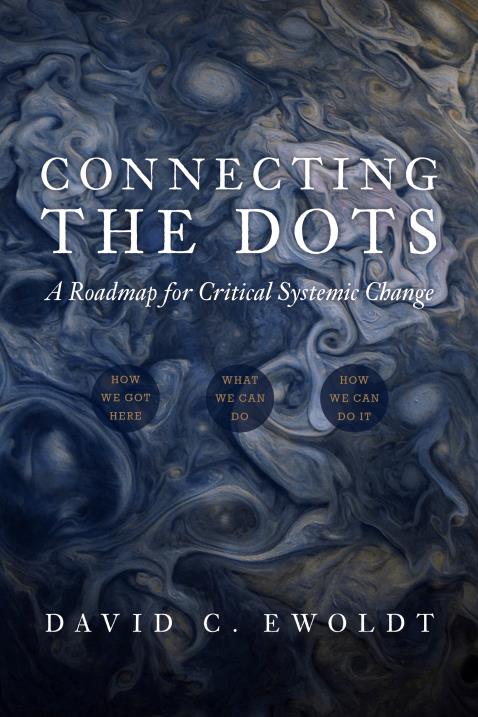Connecting the Dots: The Disconnect (the Why)
The framework begins with the major aspects of what brought us to this point in time that is fundamentally at odds with life. I refer to it as the Disconnect. Integral to the Disconnect is the way our senses of language and rationality, or often just the subset referred to as rationalization, combine with the power of stories (mythology) to manipulate and substitute for reality. This is how the diseased common root of dominator hierarchies is legitimized and its alternative, networks of mutuality, are denigrated. As Riane Eisler shows, our cultural detour into domination appears to have started about 8,000 years ago when the Earth Goddess became subjugated to the Sky Gods. Since those times, hierarchies have been expressed by the Divine Right of Kings, for example, and the division of the population into social classes. This pattern continues in today’s elite Oligarchy/Kleptocracy against the vast majority of the population. The fact that the middle class is being done away with is an indication that this policy is not being reversed. In the framing of the Occupy Wall Street Movement (2011), it’s the 1% vs the 99%-- and the 1% are “winning”.
Enlightenment Mistakes
Compound this with a number of Enlightenment mistakes that logically emerge from The Disconnect. These mistakes came to us in the form of assumptions from Francis Bacon, René Descartes, Isaac Newton, John Locke, and Thomas Hobbes, among others. Unfortunately, these men provided the philosophical foundation for the war against a nature that is deemed worthless and must be owned and subdued so we can be happy and secure; for the belief that the universe is a clockwork mechanism; for the concepts of scientific reductionism and objectivity; and for the assumption that humans are naturally aggressive and so must be restrained by a powerful state. The Enlightenment paradigm also brought us the secularization of St. Thomas Aquinas-- that is, to be in this world but not of it. This is where perpetual warfare was woven into the social fabric.
This time period was also the beginning of the enclosure of the commons in Tudor England—what I call piratization, although the politically correct term for this practice is privatization. Appropriating land and natural resources to accumulate private profit for the elite forced people from their lands and into the new and rapidly growing industrial cities of Europe. With growing populations and growing greed, ever more resources were required as soon as local ones were burned through, resulting in the scorched Earth economic policy of Industrialism I often refer to as economic cannibalism. This lead to accruing debt for imperialism. Because wars are too expensive to tax the people directly, the money must be borrowed from central banks and then repayment comes from providing monopolies to private corporations over conquered lands and peoples.
Industrialism
Then Industrialism, the growth imperative, and free-market ideology enters the picture. This now-prevailing paradigm purports that nature is not only ours to plunder, but that the plundering must occur at ever increasing rates to sustain economic growth as our primary indicator of social wealth and welfare. This delusion ignores the inconvenient truth that on a finite planet the growth paradigm contravenes the laws of physics. Industrialism uses economic growth to justify its single-minded activity of turning low-entropy resources into high-entropy wastes. This translates into converting natural and human capital into toxic landfill material after a short fondling period at ever increasing rates. This can’t come to a good end. But those reaping the greatest personal benefits are either blinded by their greed or simply don’t care about ultimate outcomes.
This is why the industrial model of American public education that began in the late 1800s is so helpful. It makes sure that we’re well indoctrinated and don’t question Enlightenment thinking, that we’re not well educated in anything other than being a better consumer, and that we are definitely never introduced to critical thinking skills. This is not part of a conspiracy, it’s a philosophy we legitimize or meekly acquiesce to partially because we’re afraid that we’re deserving of original sin and not capable of taking care of ourselves. In effect, we’re led to believe that there’s an aristocracy gene and we don’t have it.
Triumvirate of Collapse
This brings us to today, where we’re facing the Triumvirate of Collapse. I’ve broadly categorized this triumvirate as;
1) Peak Oil The end of lifestyles. Along with resource depletion in other areas, Peak Oil spells the end of economic growth and thus stock market valuations, lifestyles of conspicuous consumption and planned obsolescence. The very real social and environmental costs of carbon energy are propping up a failed paradigm. This is not only inefficient but counterproductive.
2) Global Warming The possible end of life as we know and love it. Global warming is not just greenhouse gases but deforestation and suburban sprawl as well. Hybrid cars are “branch clipping,” because they are not part of the desperately needed solution. Neither are carbon caps, trading, credits, taxes, offsets…because these are all forms of turning pollution into a profit center in an attempt to privatize the atmosphere, the last global commons, and to benefit the few elites to everyone and everything else’s detriment.
3) Corporatism The end of sovereignty and democracy. Corporatism is the merger of state and corporate power. Along with the economic cannibalism (compound interest) of central banks, corporations co-rule the Industrial Growth Society and promote the delusional thinking that market mechanisms can fix the failures of market mechanisms. These failures include decreasing quality of life and replacing it with the wholly inadequate addictive substitute of standard of living while increasing the toxicity of planet, body, and spirit—not to mention the destruction of the food web and other niggling inconveniences.
